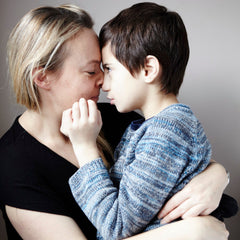
Parenting a child who is on the autism spectrum requires a lot of love and patience. The love comes naturally; the patience is something you learn to develop and cultivate. Because there are so many complex layers involved, it can be emotionally, mentally, and physically exhausting. Planning and preparation help stave off some of the chaos and frustration.

Fortunately, there are many ways to show these attributes through words and actions. In order to find more ways to connect, parents can:
- educate themselves about autism to gain knowledge and understanding,
- modify their approach,
- give their child plenty of praise and positivity,
- be patient and loving, and
- accept their child as he or she is.
Remember to Remain Calm

Repetitive behaviors and having to repeat instructions can induce stress, catching you off-guard, and resulting in your own outbursts that just make things worse. One way to manage the situation is to take a few deep breaths, give yourself a time-out to assess the situation, and remember to remain calm. Help your child use their coping techniques or try distracting them. When you focus on the needed outcome, your calm reasoning filters out behaviors that prolong your child’s emotional crisis.
The social world can be a frightening and chaotic place for your child with autism. Your child needs order, structure, and predictability to feel safe and secure. He cannot predict people in the same way as others because of difficulties understanding the emotional world and states of mind of others, such as intentions.
To help him adjust, approaches can be modified by giving your child clear instructions and communicating in a direct, concrete way. Inform your child of any potential changes to come as disruptions in routines can be very unsettling. Get to his level because he can’t get to yours; build a bridge and try to close the gap. It takes a lot of hard work and patience to connect to his world but it can be done.
Verbal praise has a positive effect. Show encouragement and support for all the good things your child does as this helps to build self-esteem and create a more positive environment. Although it can be very hard to stay calm and not lose patience when dealing with behaviors such as tantrums, and other difficult or demanding behavior, always try to focus on the good; a child reacts well to positivity.
Ask for Support

When you need support, ask for it. Whether you seek support online or in person, reaching out to friends, family, and professionals can help you cope with your needs so that you can meet your child’s needs. If you can find a support group, you may discover an outlet for sharing information and advice with other parents who have children with autism. Assess what you need to lighten your load, and ask for help.
Look at Things From Your Child’s Perspective
Childhood isn’t all fun and games, especially for children with autism. When you and your child are in the throes of dueling meltdowns, you are the one who must figure out how to turn it around. It helps to stop and look at things from your child’s perspective. Use your empathy to ask why they’re behaving this way. Ask yourself what kind of response you can give to make the behavior better. Lower your voice, measure your words, and work toward showing your child that you understand and want to help.
Break Big Hurdles Down Into Small Steps

Any problem can seem overwhelming when simply looking at the big picture, but you’ve got to start somewhere. Chip away at those obstacles that seem so daunting one step at a time. Just like children with autism may need the big tasks broken down into smaller steps, sometimes, so do you. Each small step is a chance for you to accomplish something bigger and greater. Empower yourself by taking care of the little things, and work your way up to the bigger things.
Focus on the Positive
Keep your focus on the good things that happen as often as possible. It boosts your mood, sometimes even in the most trying of circumstances, and can become contagious. Look for ways to reward your child’s good behaviors. When you praise your child for their successes, you both win.
Seek Momentary Refuge
During a meltdown, reasoning is the last thing on your child’s mind, and it is of major importance to refrain from unleashing your own frustration on them. If your child is too combative to go into a time-out place to have their meltdown, leave the room. Go into the bathroom or outside if you must, but remove yourself from the immediate situation when you feel your frustration surging too high. Do what you need to do to avoid having a meltdown of your own at your child.











1 comment
Can this information be available in Spanish and be Mail to someone who his 5 years old is 100% Autism and not receiving any help do to necessary docm
Leave a comment